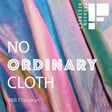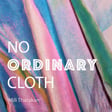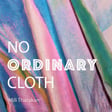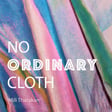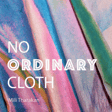
Ep 10. Disobedient Fabrics: A Journey in Smart Textiles with Linda Worbin (Part 2)
Welcome to the No Ordinary Cloth podcast, where we stitch together a tapestry of textile innovations one episode at a time. Today, we're joined by Linda Worbin, a pioneer in Smart Textiles. Join us as we explore the past, present, and future of this dynamic industry.
Linda Worbin, a Material and Innovation Developer based in Sweden, brings a wealth of experience to our conversation. With her background as a former professor at the Swedish School of Textiles and a visionary in the industry, Linda's journey spans over two decades of exploration and development in Smart Textiles, and offers valuable insights into the evolution of Smart Textiles.
In this episode, Linda reflects on her journey from academia to industry, sharing insights that have shaped the field and inspired many to follow in her footsteps. From dynamic textile patterns to the importance of collaborations, Linda's perspective provides a roadmap for future advancements.
Smart textiles, or e-textiles, offer intriguing functionalities that vastly differ from conventional textiles. Imagine fabrics that respond to environmental changes, altering colour or texture in real-time, or clothing that monitors vital signs and alerts you to potential risks. These innovations not only redefine our wardrobes but also revolutionise our everyday lives.
Episode Highlights:
- Linda's journey from academia to industry.
- Insights into dynamic textile patterns and collaborations.
- Equipping the next generation of textile makers
- The mindset of a pioneer in Smart Textiles.
- Linda’s life and influences
Join us as we follow the footsteps of someone who envisions the future of fabrics —a future where innovation knows no bounds and an ordinary cloth becomes a canvas for extraordinary possibilities. This is the No Ordinary Cloth podcast.
Connect with Mili Tharakan
Insta: @noordinarycloth
Linkedin: https://www.linkedin.com/in/mjtharakan/
Cover art: Photo by Siora, Photography on Unsplash
Music: Inspired Ambient, Orchestraman
